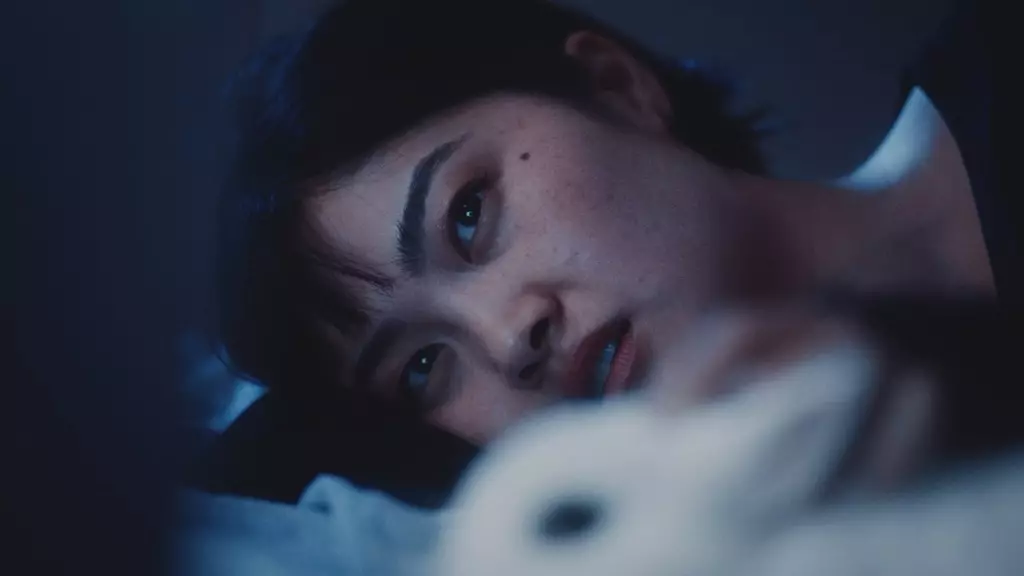Katarina Zhu’s feature debut, *Bunnylovr*, emerges as a profound meditation on identity and agency within the often chaotic backdrop of New York City. This film offers a unique lens through which we can examine the intertwined themes of familial disappointment, societal privilege, and the search for self-appreciation. Zhu’s portrayal of Becca not only invites the viewer into the life of a young Chinese American woman but also serves as a critique of modern relationships, especially those tainted by objectification and power disparities.
At the story’s center, we find Becca, a twenty-something navigating the complexities of urban life and her dual identity as a cam girl. This profession, often stigmatized, provides insight into her character’s struggles with societal expectations and her desperate yearning for genuine connection. Becca’s life takes an unexpected turn with the arrival of Milk, a bunny gifted by a client who becomes a symbol of both burden and joy. The initial reluctance that Becca feels toward Milk highlights her hesitance to embrace anything—be it relationships or responsibilities—that elicits deeper emotional engagement.
The film juxtaposes Becca’s obligations as a performer with her need for personal fulfillment, creating a rich tapestry that examines how her relationships influence her self-image. As viewers, we witness Becca’s cosmic dance with her estranged father, William—a chance encounter that catalyzes her confrontation with unresolved feelings and the deep-rooted impacts of parental absence. Their interactions unfold against the backdrop of Becca’s other relationships, each fraught with disappointment and disillusionment, ultimately portraying how these dynamics bleed into her everyday life.
Zhu expertly crafts the character of John, a cam client whose mysterious allure is overshadowed by his toxic behavior. Their connection serves as a commentary on the precarious nature of transactional relationships, particularly those in the digital age. Becca’s complex feelings toward John highlight a common conflict—seeking intimacy while grappling with the often dehumanizing facets of modern exchanges. The fact that financial transaction adds another dimension of power imbalance underscores how vulnerability can be exploited, forcing the audience to question the authenticity of such connections.
The supporting characters, particularly Becca’s best friend Bella, offer further insight into the intricacies of female friendship. Bella’s self-absorbed artistic pursuits result in emotional violation for Becca, who is subjected to her friend’s “feminist” projects. This relationship reflects a broader commentary on how sometimes those closest to us can inadvertently cause harm due to their inability to comprehend our boundaries. Yet, Bella’s character arc grows, showing that genuine friendship can evolve and transform in meaningful ways when compassion and care prevail.
As Becca grapples with her experiences, the adorable yet vulnerable presence of Milk becomes a pivotal aspect of her journey toward self-acceptance. Initially viewed as just an obligation, Milk transforms into a source of unconditional love and responsibility—offering Becca a safe space to develop the nurturing side of her personality that has been buried beneath other’s expectations. By loving and caring for this creature, Becca begins to reclaim her sense of agency. This relationship ultimately fosters a mindfulness that allows her to sift through the debris of her past relationships, confronting both the toxic and the tender.
In its essence, *Bunnylovr* is not simply about the trials of a young woman trying to find her footing but is a poignant exploration of how individuals reconcile their own needs within a society often grooming them to please others. The relationship between Becca and her estranged father stands as a significant subplot, where the rabbit symbolizes not just Becca’s healing but also her capacity for forgiveness and reconciliation.
*Bunnylovr* delivers an evocative and cathartic experience that resonates widely with anyone grappling with the challenges of human connection in today’s digital-first world. Zhu bravely navigates this complex terrain, drawing from her own experiences to create a narrative that is as personal as it is universal. The film leaves its audience with a message of empowerment, encouraging viewers to identify their worth apart from others’ expectations, ultimately allowing them to abandon parasitic relationships and embrace healthier connections. As Becca’s journey unfolds, the film illustrates that true fulfillment is not found in external validation but in self-love and acceptance.

